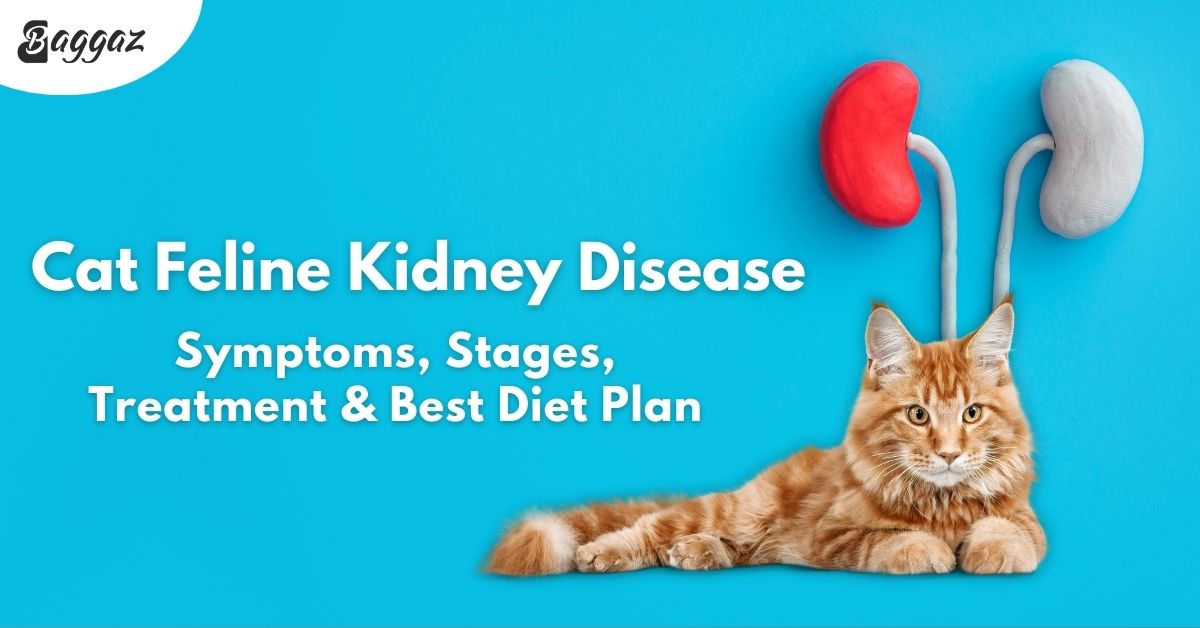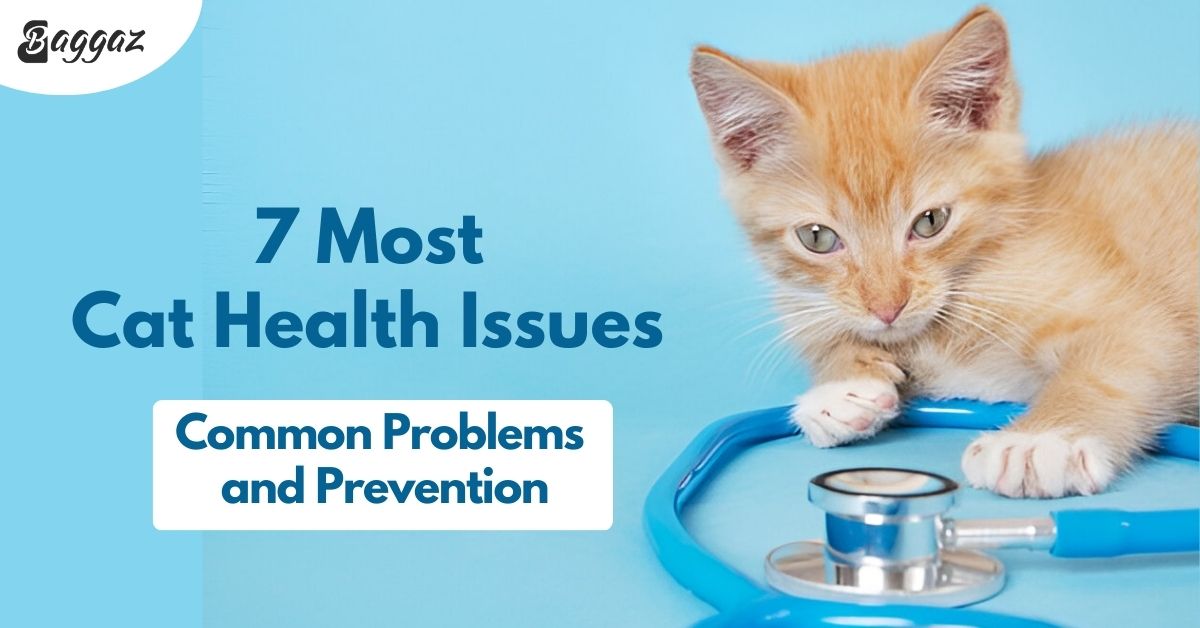Cat Feline Kidney Disease: Symptoms, Stages, Treatment & Best Diet Plan

Table of Contents
-
- Introduction of Cat Feline Kidney Disease
- What is Cat Feline Kidney Disease?
- Stages of Feline Kidney Disease
- Early-Stage Kidney Disease in Cats
- Moderate-Stage Kidney Disease
- Advanced-Stage & End-Stage Kidney Disease
- Common Symptoms of Feline Kidney Disease
- Early Warning Signs
- Severe Symptoms & When to See a Vet
- Treatment Options for Feline Kidney Disease
- Medical Treatments & Medications
- Home Care & Supportive Therapies
- Is There a Vaccine for Feline Kidney Disease?
- Best Diet Plan for Cats with Kidney Disease
- Recommended Nutrients & Supplements
- Best Cat Food for Kidney Disease
- Understanding the Progression of Feline Kidney Disease
- How to Prevent Kidney Disease in Cats?
- Conclusion
- FAQs
Introduction to Cat Feline Kidney Disease
Cat Feline Kidney Disease: Many cats become affected by Feline Kidney Disease as they get older, which causes great sadness for owners. This condition moves gradually, which makes detection difficult in the beginning stages. The proper knowledge and care enable you to enhance your cat’s longevity while promoting their happiness. The following information will present complete details about symptoms while explaining treatment options as well as diet approaches beneficial for cat kidney health.
Feline Kidney Disease in cats is known by the medical name of Feline Kidney Disease. A chronic disease causes feline kidney failure by causing the kidneys to lose their blood filtration functionality. Medically, it develops under the name chronic kidney disease in cats (CKD). Besides maintaining blood pressure and electrolyte balance, the kidneys monitor water consumption and hydration levels. The failure of the kidneys causes rapid health deterioration in your cat.
Stages of Feline Kidney Disease
-
Early-Stage Kidney Disease in Cats
This stage is tricky. A person cannot detect any indications during this phase. Veterinarians detect polycystic kidney disease through standard blood examinations in combination with senior health assessments. The blood creatinine measurement might present a slight increase. Your cat will likely drink bigger amounts of water than normal and urinate at increased rates.
The functioning ability of kidney tissue in cats remains at approximately a 65 to 75 percent level during this stage. The disease progression can be slowed down with the current treatment initiation. Your cat will benefit substantially from dietary changes combined with nutritional supplements.
-
Treatments and Signs:
Treatment measures at this point are likely to produce positive effects in affected feline patients. It’s the best time to act. This stage reveals that kidney function has deteriorated to a significant extent. The kidney function impairment increases creatinine and BUN (blood urea nitrogen) blood levels. One sign your cat shows includes weight loss, together with a lackluster coat quality and occasional vomiting incidents. Signs of lethargy and bad breath will become apparent along with other symptoms during this phase.
The kidney functions of cats with moderate-stage kidney disease operate between 25% and 50% efficiency. Advanced medical management starts at this point for treating feline kidney disease. The veterinary professional provides treatment recommendations that include fluid therapy, together with phosphate binders and a specific dietary plan for renal patients using renal kattovit feline diet. Hydration becomes critical.
-
Advanced-Stage & End-Stage Kidney Disease
The most dangerous form of the disease exists in this condition. Kidney function is below 25%. Your cat will likely develop a complete refusal to eat and experience extreme dehydration, which leads to total loss of energy. Breath that contains ammonia will typically provide a noticeable odor. Ulcers within the mouth and extreme weight reduction become visible symptoms of kidney disease.
The symptoms that develop from feline renal failure can become fatal. Confusion, along with vomiting and seizures, becomes a life-threatening risk for affected cats. Your vet will either endorse palliative treatment or discuss possible humane choices based on the current life quality of your cat.
Supportive care helps cats survive both months and years after the diagnosis of kidney disease. Home fluid therapy becomes a standard procedure for managing the kidney disease of feline patients during this stage.
Common Symptoms of Feline Kidney Disease
-
Early Warning Signs
To effectively slow this disease, one must detect its early indicators. Here’s what to look out for:
-
- Increased thirst
- More frequent urination
- Weight loss
- Decreased appetite
- Lethargy
- Bad breath
The initial symptoms must not be dismissed, despite being faint. The signs of kidney disease normally present early in feline patients, marking the initial stages of this disorder. Blood tests with urinalysis at the veterinarian’s facility could be essential to saving your feline’s life.
The relationship between water dehydration and kidney diseases appears commonly in feline patients. To check your cat’s dehydration, you should gently press their neck skin. The speedy recovery of skin indentation after a pinch checks whether your pet shows signs of dehydration.
Severe Symptoms & When to See a Vet
The disease signs become difficult to ignore when the condition has progressed.
-
- Vomiting
- Diarrhea
- Weakness
- Sores in the mouth
- Drooling
- Seizures
- Collapse
Severe kidney failure in your cat can be detected when these signs appear. The expected outcome for cat kidney disease rests heavily on starting prompt medical care at the current time. Your cat might need hospitalization at the clinic, where the vet will provide intravenous fluids and medication. Don’t wait—get help immediately.
An early feline kidney disease diagnosis gives your cat the possibility to live several additional years. Neglecting these warning signs will result in a quick collapse of your heart.

Treatment Options for Feline Kidney Disease
-
Medical Treatments & Medications
The primary goal of medical treatment after a diagnosis consists of arresting the disease progression, together with symptom management. Medical treatment continues even without an available cure for the disease.
Treatment of feline renal disease consists of the following aspects:
-
- Fluid therapy (subcutaneous or IV)
- Blood pressure meds
- Anti-nausea medication
- Phosphate binders
- Potassium supplements
- Special renal prescription diets
Your veterinarian may recommend ACE inhibitor medications, which help enhance blood circulation within the kidneys. Antibiotics combined with hormone therapy may be needed to address secondary conditions.
Home Care & Supportive Therapies
The support provided at home proves essential for the treatment. Here’s what you can do:
-
- Set multiple accessible areas for the fresh water supply
- You should provide your pet with drinking fountains to increase their water consumption.
- Heat to a comfortable temperature all wet foods will stimulate your cat’s appetite.
- Give sub-q fluids if prescribed.
- Supplementary omega-3 fatty acids designed for cats should be included as part of their treatment.
Herbal teas and slippery elm supplements, as well as cat acupuncture, have become topics of research for home remedies of kidney disease in felines. The alternative treatments serve as additional comfort measures for kidney disease in cats without replacing veterinarian medical care.
Is There a Vaccine for Feline Kidney Disease?
Medical practice today does not have a vaccine to prevent Feline kidney disease. Feline kidney disease appears on its own because the condition shows no single bacterial or viral cause, which leads to its development. Current clinical evidence demonstrates that normal aging processes, with genetic conditions and chronic diseases, and poisonous ingestions combined with infections, cause this condition. Since Feline Kidney Disease cannot be transmitted between animals, a regular vaccine cannot stop its development.
Many scientists are currently studying methods to stop feline morbillivirus dissemination because numerous experts consider this virus as a source of cat kidney inflammation. The studied data indicates potential progress toward developing future vaccinations.

Best Diet Plan for Cats with Kidney Disease
-
Recommended Nutrients & Supplements
The dietary changes you make represent the most significant aspect when dealing with this illness. The dietary needs for CKD cats specifically target two essential aspects through the reduction of renal workload while controlling blood waste levels. Here’s what to look for:
-
- Inside the diet of a kidney disease-affected cat’s low phosphorus plays a vital role in slowing the progression of kidney damage.
- Moderate-to-low protein – Reduces waste buildup.
- High moisture content acts as a beneficial hydration method for cats.
- Observing Omega-3 fatty acids consumption leads to reduced kidney inflammation and improved organ function.
- Strong support for health maintenance, together with protection against deficiencies, comes from potassium and B vitamin supplements.
Prior to supplement use consult your veterinarian since many cats find benefit from renal support chews combined with fish oil and potassium gel. The kidney-friendly supplements for cats enable better energy levels and increased appetite.
Hydration is everything. Feline nutrition based on ample moisture content particularly through wet food food presents significant benefits for cat health. CKD cats cannot meet their nutritional needs exclusively through dry food consumption.
Best Cat Food for Kidney Disease
Choosing the right food is critical. Look for vet-recommended or prescription renal diets. These are designed to reduce kidney stress while keeping your cat full and energized.
Here are some of the best wet foods for cats with kidney disease:
-
- Hill’s Prescription Diet k/d
- Royal Canin Renal Support
- Purina Pro Plan NF Kidney Functions
- Blue Buffalo Natural Veterinary Diet KS
- Forza10 Nutraceutical Actiwet Renal
Looking for the best dry food for cats with kidney disease? It’s available but not preferred. If needed, choose high-quality, low-phosphorus kibble and supplement with wet food. Avoid high-salt snacks and treats with unknown ingredients. Always check the phosphorus and protein levels before introducing new food.
Understanding the Progression of Feline Kidney Disease
The speed at which the condition develops depends on various factors. The progression rate primarily depends on where your cat is at in the disease process and their health status together with their age. The condition maintains stability for years when your pet receives appropriate medical care. For others, it progresses quickly.
CKD progresses slowly in its forward movement, especially when detection occurs early enough. Help from vets through proper treatment methods enables a dramatic reduction of kidney disease progression in cats. Despite the early stage of the condition, cats usually survive for numerous years before experiencing any symptoms.
The life span shortens significantly when a cat enters its last phase. Blood tests provide the most reliable approach for monitoring kidney disease progression. Clinicians use Creatinine and BUN and SDMA measurement results to evaluate the condition.

How to Prevent Kidney Disease in Cats?
Protection against this condition is difficult, but proper actions will make it less likely to occur. Here’s how:
-
- Hydration, hydration, hydration – Keep your cat drinking. Food with added water or water fountains should be provided to your cat for drinking.
- Keep dangerous antifreeze along with lilies and medicines which are harmful for cats in areas where they cannot reach.
- The choice of high-quality foods should replace eating processed food fillers. Kidney-friendly formulas should be served to senior cats as soon as possible even if kidney disease symptoms have not manifested yet.
- The detection of hidden health issues occurs through regular vet blood tests before serious complications appear.
- Other diseases need to be controlled because high blood sugar, high blood pressure, and dental infections can affect kidney health.
- Protecting your cat from obesity helps reduce the risk of kidney stress and numerous related health problems.
- Boasting a healthy lifestyle means enabling your cat to experience strength and constant movement alongside contentment. The future duration of senior cat kidney health depends on today’s minor adjustments.
Conclusion
Treatment of Cat Feline Kidney Disease provides serious hope for recovery. Your cat can continue living a full life when kidney disease is detected early and proper medical care is provided and a specific diet is recommended for them. You can make a difference no matter which stage your pet is at either the beginning or during the advanced phase of treatment.
You have obtained sufficient knowledge about feline kidney disease progression and home care that enables you to support your cat’s health needs. Your love, combined with your attention and active involvement, will direct the disease in different directions.
FAQs
1) What agents lead to kidney disease development in feline patients?
Age-related factors alongside genetic issues join toxins and persistent infections, and specific drugs as primary reasons for kidney disease in cats.
2) Does kidney disease have any chance of recovery in cats?
Treatment along with proper dietary choices allow cat owners to properly handle the condition of chronic kidney disease even though the condition has no known cure.
3) What strategies exist for me to provide proper hydration to my cat?
Fountain water consumption and regular feeding of wet food alongside water addition to each meal will benefit your pet.
4) Does Cat longevity with kidney disease depend on various factors?
It varies. Proper care enables affected cats to enjoy several contented years following their diagnosis of kidney disease.



